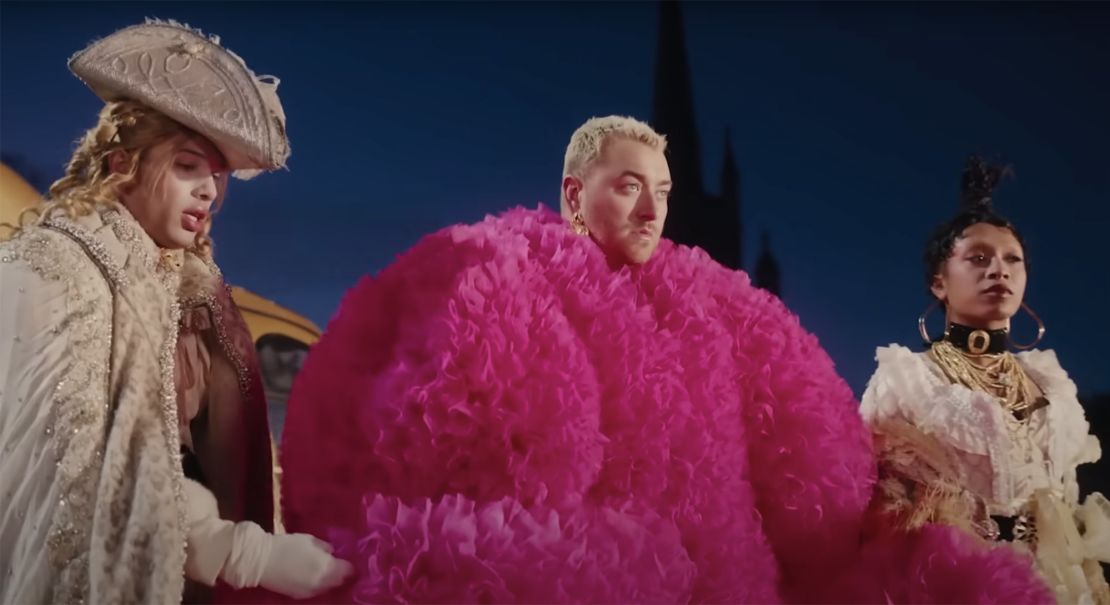Editor’s Note: Hannah Ryan is an associate producer for CNN International who has previously written on LGBTQ rights. The views expressed in this commentary are her own. Read more opinion on CNN.
Sam Smith’s recent music video for their song “I’m Not Here To Make Friends” is a cacophony of queer delights. To set the scene: the singer emerges from a golden helicopter in a gloriously fluffy pink coat and enters a stately home. From that point on, euphoria abounds.

Smith soon dons a full black evening dress, accessorized with an ornate headpiece. They dance with handsome men in their underwear. They wear nipple tassels and exude confidence. They swing from a chandelier without a care in the world.
When I watched the video — which I sought out after seeing the huge reaction across social media to it (both positive and critical) — I found myself grinning from ear to ear. Here was a non-binary person proudly embracing their identity, and there was no sanitization in sight of their own queerness.
Amid furious debate over transgender rights — particularly in the UK and the US — and fears about the rolling back of LGBTQ freedoms, Smith’s tribute to all things queer is a welcome reminder that there is a great deal of joy in being LGBTQ.
Ours is a vibrant community, characterized not by pain but by our commitment to being our truest selves — regardless of what the backlash to that might be — and to carving our own paths out away from the traditional path of heterosexual life.
Things haven’t been especially easy for queer people in recent times. In November 2022, a gunman opened fire at an LGBTQ nightclub in Colorado. Five people were killed and 25 others were injured. In the same year, Florida passed the controversial bill dubbed “Don’t Say Gay” — a piece of legislation that essentially bans teachers from discussing gender and sexuality with young students in schools.

After the US Supreme Court overturned Roe v. Wade in June 2022, Justice Clarence Thomas called for other rulings to be revisited, including Obergefell v. Hodges — the landmark case which gave same-sex couples the right to marry across the US.
On the other side of the Atlantic in the UK — where Smith is from and where a considerable chunk of their audience resides — trans and non-binary people have also found themselves in the firing line of heated conversations over their rights.
In recent weeks, there has been criticism leveled toward trans activists and their allies following the proposed Gender Recognition Reform Bill in Scotland and the UK government’s decision to block it.
Many LGBTQ people, including myself, are worried right now. It feels as though our lives are up for debate — despite progress being made in recent years. And that’s exactly why Sam Smith’s song and its accompanying video matters so much right now.
Our community is in desperate need of solace, and I know a music video isn’t going to heal us from everything that’s been thrown at us lately. But this one serves as an affirming balm.
The image of Smith — like a monarch, surveying their kingdom from a grand staircase — is both radical and refreshing. No one can touch them. Homophobia and transphobia will not keep us oppressed; we will simply make crowns and create a new world — one where we are free to dress as we please, to sleep with who we please and to take pride in it all.
Smith’s video — and the song’s unfiltered embrace of queer sexual liberation — follows in a long line of tradition amongst the LGBTQ community, in which we respond to attacks on our identities by doubling down. In 1978, the androgynous, gay disco star Sylvester released “You Make Me Feel (Mighty Real)” — a song unequivocally dedicated to a same-sex relationship.
Sylvester’s song was released at the tail end of the 1970s and often played in the ballrooms that queer people — many of whom had been kicked out of their family homes — gathered at on Friday and Saturday nights. Ballrooms were magical places, where LGBTQ people facing ostracization from the rest of society could find a safe haven. In the ballrooms, “You Make Me Feel (Mighty Real)” pounded through the speakers and queer people escaped the ugly head of homophobia and transphobia — even if only for a night.
The song — and the setting that it soundtracked — was a tonic for queer folks as they navigated a world that didn’t want them.
Later on, when the AIDS crisis gripped LGBTQ communities in the 1980s, Sylvester used the popularity of his disco hit to raise awareness of the disease — further cementing the song as a rallying cry for queer people to recall joy, even in dire times.
Now, Smith’s music — and the accompanying video — is working to remind us that queerness is not just about trauma or grief. Queerness is a gift to us, one which we deserve to celebrate in whatever way we like — whether that’s through outlandish outfits and debauchery or through surrounding ourselves with fellow community members and dancing until our feet feel like they might fall off.
Get our free weekly newsletter
- Sign up for CNN Opinion’s newsletter.
- Join us on Twitter and Facebook
Earlier this week, Smith and Kim Petras — a trans woman — accepted a Grammy award for their camp hit “Unholy.” Seeing them on stage, in front of a huge audience, I thought about how both of them are using their music to portray queer experiences without watering anything down, and without baying to the pressure of the voices that want them to rein in their joy.
Long may they keep reminding us that queerness is a precious thing — even when it feels like the world wants to strip it away from us.



